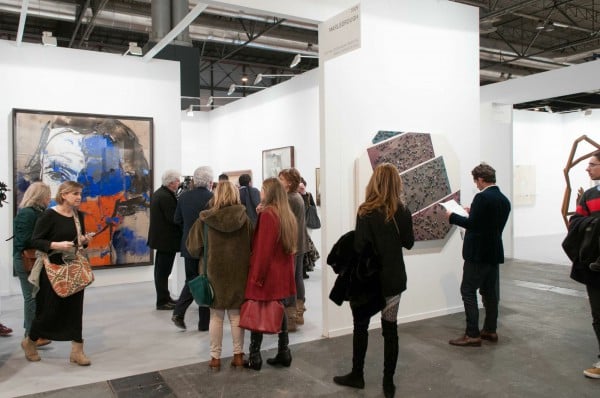
The 33rd edition of the Spanish art fair ARCO Madrid came to a close on Sunday. Dealers across the fair reported considerable sales throughout the week, leading some to suggest that Spain’s market woes have come to a close (at least as far as art is concerned). A focus on wall-based work, whether painting, photography, sculpture, or works on paper, was pervasive across ARCO, where only three video works were reported to have been on view. That resulted in booths generally deemed safer than in previous years. That is, with the exception of Paris’s Chantal Crousel, who brought a solo show of Jose Maria Sicilia and Antwerp’s Galerie Micheline Szwajce, which showed a large installation by Matt Mullican.
The halls were full throughout ARCO’s run, with energy added by a narrowing of the fair’s aisles and general tightening together of booths—although it was unclear if the booths themselves were smaller on average. More spacious fair layouts typically prove popular, but the story at ARCO is quite the opposite. Both visitors and dealers claimed that the move, spurned by popular fair director Carlos Urroz, was a hit.
For young and established galleries alike, ARCO Madrid’s draw has as much if not more to do with its transatlantic, Latin American connection as with art-hungry Spanish collectors. The fair reportedly spent €1 million, nearly a quarter of its €4.5 million (US$6.2 million) total budget, on bringing 500 collectors and museum staff to Madrid. It paid off. Collectors from North and South America as well as your typical slew of Europeans could be seen roaming the halls and buying as well.
Sales flowed in at a steady and comfortable (if not breakneck) pace throughout the five days. Most of the business done centered on the low-to-mid market, with €20,000 (US$27,400) seeming to be the median price point of sales and the top of the market hovering around the €60,000 (US$82,200) mark. Berlin dealer Michael Schultz reportedly brought the fair’s most expensive work, Gerhard Richter’s Abstraktes Bild 503 (1982), which he previously showed at Art Stage Singapore. At ARCO, Schultz was asking €8.5 million (US$11.4 million).
Madrid native Helga de Alvear found success with this wall sculpture by Angela de la Cruz, which sold for €60,000 (US$82,200) early on in ARCO’s run. The Spanish artist, who was nominated for the Turner Prize in 2010, has been a hot commodity on the European fair circuit over the past year.
Thomas Schulte also saw solid results with an abstract, blue work by Spanish painter Juan Uslé. Titled Two in Blue Note (2013), the painting sold for €65,000 (US$89,000). Overall, Schulte reported being very happy with his results at ARCO, on whose board he currently serves.
Kewenig, which moved from Cologne to Berlin last year and returned to ARCO after a conspicuous hiatus, sold an Elger Esser photograph titled La Grande Be (2009) for €40,000 (US$55,000).
Sales in the sub-€20,000 market had more legs. Madrid-based gallerist Javier Lopez sold a fresh-from-the-studio KAWS, NYT (2909) (2014), for US$16,8000.
Berlin’s Mehdi Chouakri sold Mathieu Mercier’s Drum and Bass 182 (2002-2013), a wall-based sculpture featuring a shelving system with various office supplies in primary colors, for €18,000 (US$24,750). The booth also featured an impressive collection of 21 posters by Hans-Peter Feldmann created in 1976-77.
Galeria Filomena Soares sold Rodrigo Oliveira’s wall sculpture Fachada Suprema (Luxalon) (2014), which looks something like a Damien Hirst Medicine Cabinet on which an Ab-Ex painting has had an attack of norovirus, for €16,000 (US$22,000).
Barcelona’s ADN Galeria had what was perhaps ARCO’s best bargain, 54 Carlos Aires works on bills from various currencies. All come from his ongoing Disaster Series and were each priced at the impulse-buy price of €1,000 (US$1,370). By Friday, the gallery had already sold 13 of the works, which became a focus of buzz throughout the fair.
ARCO’s #FocusFinland section seemed to be a hit for visitors with its more daring booths, like a large-scale sculpture by young Helsinki-based artist Anna Rokka. Sales proved positive as well, with major Finnish force Galerie Forsblom having continued success with abstract works by young Spanish painter Secundino Hernandez.
However, the market in the section proved to mostly fall under the €10,000 mark. At AMA gallery, Elina Brotherus’ photograph L’Etang (2012) went for €8,500 (US$11,600). And Mia Hamari’s quirky bronze and bone sculpture at Gallery Forum Box sold for €2,980 (US$4,080).
Sources say the general aesthetic of the works on view from Finnish galleries was on the money for the Spanish collectors in attendance. However, questions remain as to whether the country will have a lasting presence at ARCO. By way of comparison, only two Dutch galleries were present this year after being featured in a similar focus section in 2012.
David Ulrichs contributed reporting to this story from Madrid.